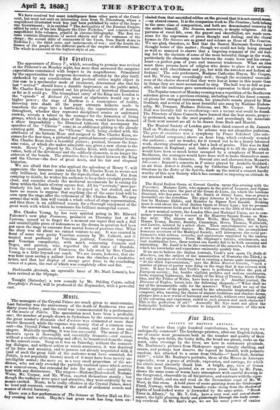The Royal Italian Opera at Covent Garden opens this evening
with the Troratore. Madame Lotti, who appears in the part of Leonora, and Signor Debassini, who takes the part of the Count de Luna, (in which the baritone Graziani, who has gone over to Mr. Smith of Drury Lane, was so great a favourite) are the novelties. The gipsy Azucena is to be personated as be- fore by Madame Didieep and Maniac° by Signor Neri Baraldi. Nothing more is said about the rival Italian Opera at Drury Lane ; but we presume the announcement holds good that it will open on the 25th of this month.
A new musical society, the London Glee and Madrigal Union, arc to com- mence proceedings by a concert at the Hanover Square Rooms on Mon- day next. The singers are Mies Wells, Miss Spiller, Miss Eyles, Messrs. Young, Baxter, Bamby, Cummings, Howe, Thomas, Wallworth, and Lawler, assisted by a select choir. Their entertainments are to have a new and remarkable feature. Mr. Thomas Oliphant, the accomplished honorary secretary of the Madrigal Society, will intersperse the vocal per- formances with notices, remarks, and annotations suggested by the various pieces in the programme. From Mr. Oliphant's talents, attainments, and vast madrigalian lore, these notices can hardly fail to be both amusing and interesting. Mr. Land is to be the conductor of the concerts, a function for which his knowledge and experience eminently qualify him.
If we are to believe the Italian journals, Verdi's new opera Un Ballo di Maechera, (on the subject of the assassination of Gustavus the Third,) is not only a paragon of excellence, but is creating a furore quite unexampled. "At the third representation," says the Milan Musical Gazette, "such a number of pieces of poetry were flung on the stage that it was covered with them. It may be said that Verdi's opera is performed before the pick of European society; for, besides vigilant prelates and zealous earabineent, lords, reigning highnesses, the family of the King of Prussia, Maria Chris- tina, and the Prince of Wales, have been to see it." Another journal, the Diorama of Naples, bursts into the following rhapsody—" What shall we say of the innumerable calls for the maestro ? What shall we say of the frantic applause of the public, moved by the admirable inspirations of the composer, who, bursting the chains of ancient traditions and obsolete forme, plunges into a new world of harmony and melody, without ever losing sight of the colouring and expression suited to each passion and each character? This is the perfection of art!" Assuredly Mr. Gye must not allow the fashionable habituis of his theatre to languish in ignorance of this new musical wonder.


























 Previous page
Previous page